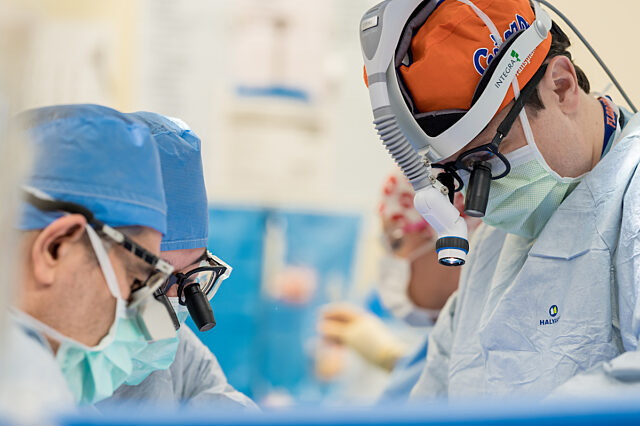UF Health Shands Transplant Center programs among nation’s best
Liver transplant program outcomes No. 1 nationally, kidney a close second

The Scientific Registry of Transplant Recipients ensures every program that offers organ transplant is included in an ongoing evaluation of its outcomes. According to the July 2023 report, UF Health's are among some of the best. Photo by Louis Brems.
With patient outcomes in the nation’s top 10%, the UF Health Shands Transplant Center is once again Florida’s foremost destination for transplants. As of July 2023, five organ transplant types demonstrate exceptional results as evaluated by the Scientific Registry of Transplant Recipients, or SRTR.
SRTR’s five-tier outcome assessment looks at three main metrics: survival on the waiting list, getting a transplant faster and one-year organ survival.
Currently, around 100,000 people are awaiting lifesaving organ transplants in the United States. According to the data, anyone who comes to UF Health Shands Hospital for a transplant can rest assured they’ll be cared for by experts in the field.
The liver transplant program, led by Thiago Beduschi, M.D., was No. 1 in the country based on these metrics, outstripping 149 other programs. The kidney transplant program was graded the best in Florida and second in the nation among 256 centers. To round out abdominal organ transplant surgeries, the kidney-pancreas transplant program was also nationally recognized, with the third-highest metrics in waitlist survival, time to transplant and one-year organ survival.
“Our exceptional team of skilled surgeons, compassionate health care professionals and infrastructure has played a pivotal role in this remarkable achievement,” Beduschi said. “Our liver transplant patient survival rate is greater than 99% — an accomplishment that has never occurred for a program of our size. Our kidney program has also achieved the best survival in Florida,” Beduschi said. “We are a team that puts our patients first. We have transformed lives, offering hope and renewed possibilities to patients needing organ transplants.”
In the past few years, the UF Health Abdominal Transplant Program has established itself as a national leader across outcomes, patient experience and innovation, regardless of whether a patient requires a liver, kidney or pancreas transplant. In fact, multiorgan transplant data calculations rated the technically complex procedure of a heart-lung transplant as best in the state and top 5 in the nation.
“As we celebrate this significant milestone, we remain dedicated to continuous improvement and further advancements in organ transplantation,” Beduschi said. “Together, we will continue to strive toward medical excellence and provide exceptional care to all those in need.”
UF Health’s strength as a transplant center encompasses other organs, too. Patients seeking a lung transplant can breathe easy — the UF Health Shands lung transplant program was in the top 10 nationwide, placing eighth among 74 health systems.
“We’re proud of short-term and long-term survival outcomes. They reflect our commitment to seeing patients thrive beyond their initial lung transplant,” said Amir M. Emtiazjoo, M.D., M.Sc., medical director of the lung transplant program. “From our perspective, a transplant is just the beginning of the rest of the patient’s new life.”
The lung transplant team includes experts in advanced treatments like extracorporeal membrane oxygenation, or ECMO, and physicians who have performed transplants for patients with advanced end-stage lung diseases.
The outcomes speak for themselves, said Mindaugas Rackauskas, M.D., Ph.D., surgical director of the lung transplant program.
“We hope that when patients come to us, they trust we will put them first — and be their first step to a journey of better health and opportunity,” he said.
Improving health is the shared mission throughout UF Health, noted David R. Nelson, M.D., senior vice president for health affairs at UF and president of UF Health.
“Our teams of providers work together every day to develop solutions to the health care problems faced by their patients,” Nelson said. “This level of collaboration and shared commitment to developing innovative clinical treatments culminates in patient outcomes like we see in our transplant program.”